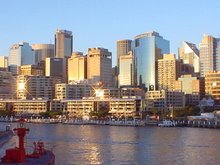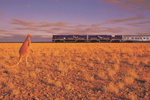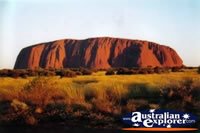The Indian Pacific train trip from Sydney to Perth (coast to coast, E/W) is 2700 miles long; driving distance from Washington DC to LA is about the same.
Geological Origin: Australia is estimated to have separated from the Asia/Africa land mass on the order of 100M years ago. As a result, Bryson says, 80% of all plant and animal life in Australia exists only in Australia.
First humans, the Aborigines, arrived, presumably by boat, by various estimates from 40,000 to 70,000 years ago (source: Wikipedia). This would have required a sea crossing of at least 60 miles, though something I read said that a glacial period could have shortened the distance. It would also have required enough colonists to propagate the population. Much is unknown. Bryson was amazed that he found little interest (his book was published in 2000) in understanding the origins of the Aboriginal people.
European Contact and Settlement (source: Bryson): There is evidence of European presence in Australia as early as 1525, but the real story starts with James Cook's discovery and flag-planting in 1770. He sailed along the east coast and found it to have "a very agreeable and promising aspect." Little did he know what lurked inland. Also, his voyage was during the wet season. This picture of Captain Cook from Wikipedia.

A few years later, England was casting about for a new place to send its undesirable citizens (the United States having been lost). How about Australia? Accordingly, eleven ships with a colonization group of prisoners and guards (1500 people total) left England in 1787. The trip took eight months and they arrived in mid-summer -- not the conditions that Cook had seen. Seeking a better location, the fleet sailed a ways north and settled in what is now Sydney Harbour. They were ill-prepared, but they survived and eventually prospered.
Further settlement and expansion took place over the next century and six colonies were formed. In 1901, these colonies became a federation and thus created the Commonwealth of Australia. Roughly, Australia has been a country half as long as has the United States.
OK, got the boring stuff out of the way.
Bryson tells this story with more humor. One incident: a French ship arrived at SE Australia quite soon after Cook did. A few days earlier, Bryson says, would have "saved the country two hundred years of English cooking."
G'day
Rob





No comments:
Post a Comment